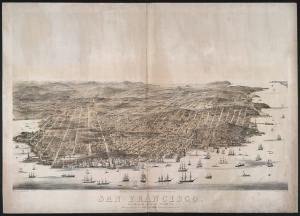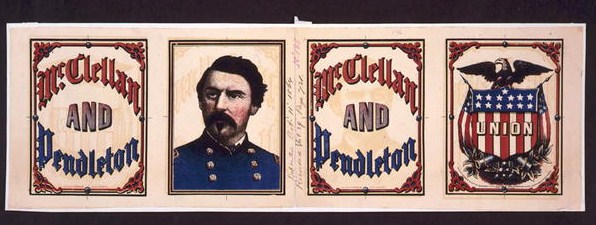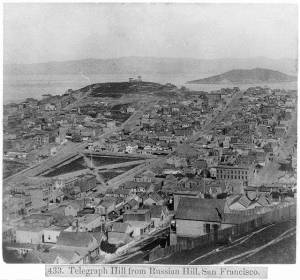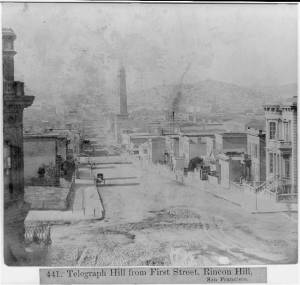fireworks by the bay
150 years ago this week politics was a major topic out in the Far West. The September 9, 1864 issue of San Francisco’s Daily Alta California featured side by side coverage of a couple political rallies from the evening before. The Union mass meeting was held at Platt’s Hall. Several thousand “Copperheads” met at Portsmouth Square:
All the district clubs came marching in procession, many of them with music and transparencies. A large platform had been erected on the square, and it was lighted by gas. On the eastern side of the platform were high posts, between which was stretched an American flag, backed by a painting containing portraits of McClellan and Pendleton, life size. At each side of the portraits were transparencies, one containing the names of the electors, the other those of the nominees for Congress. A brass band was in attendance, and supplied music before the beginning of the speeches, and at the close of each. Bonfires were lighted on Brenham Place, and some speeches were made in that neighborhood. A number of rockets and Roman candles were let off before the opening of the meeting, so that all the attractions of music, bonfires, fireworks and processions were used to attract a crowd. A large number of persons were present – several thousand – the whole square was covered with people.
The first speaker, J.P. Hoge, likened General McClellan to past American heroes:
He considered the Chicago nominee as the best man in the nation for the position. He has the prudence, the patriotism, and the wisdom of Washington, the energy, the indomitable will of Andrew Jackson, and the profound knowledge of our institutions of all the fathers of the country. In one sentence of his West Point; speech he said: “A war so just and righteous, so long as its purpose is to crush the rebellion and to save our nation from the infinite perils of dismemberment.” That sentence contains the essence of the Chicago Platform, the maintenance at all hazards of the integrity of the Union and the principles of the Constitution. In his letter of acceptance he will say no more than he said in his West Point speech, and he will say no less. We go for the reconstruction of the Union, the supremacy of the Constitution. The question is, George B. McClellan and the entire Union against Abe Lincoln and Abolition.
It’s way out west, but the demonstrations are similar to all the other political rallies I’ve been reading about for the past four years. And the message seems to be the same. With General McClellan you get a restored union without the abolition.
The telegraph continues to impress – I’m pretty sure there are some New York, September 8th datelines on the front page of the September 9th issue, which sure is a lot better turn around than I managed this week.
Telegraph Hill was not named for the 1862 electrical telegraph but for a 1849 semaphore that signaled information to the city about the nature of approaching ships.




